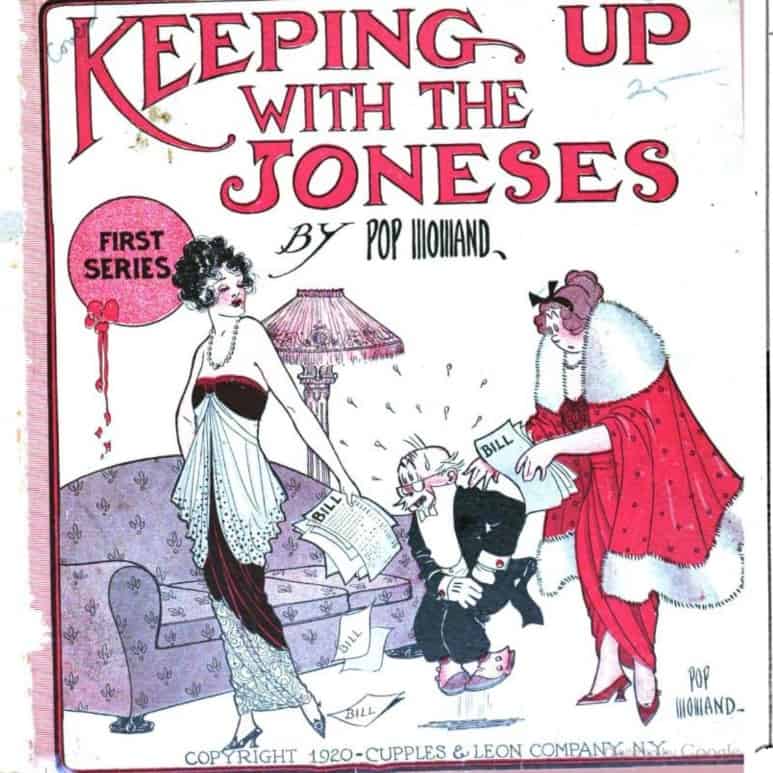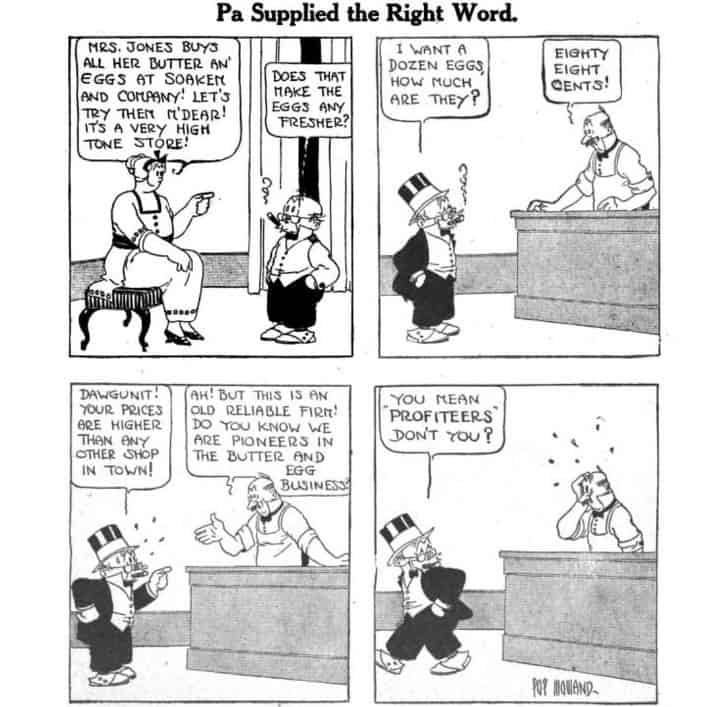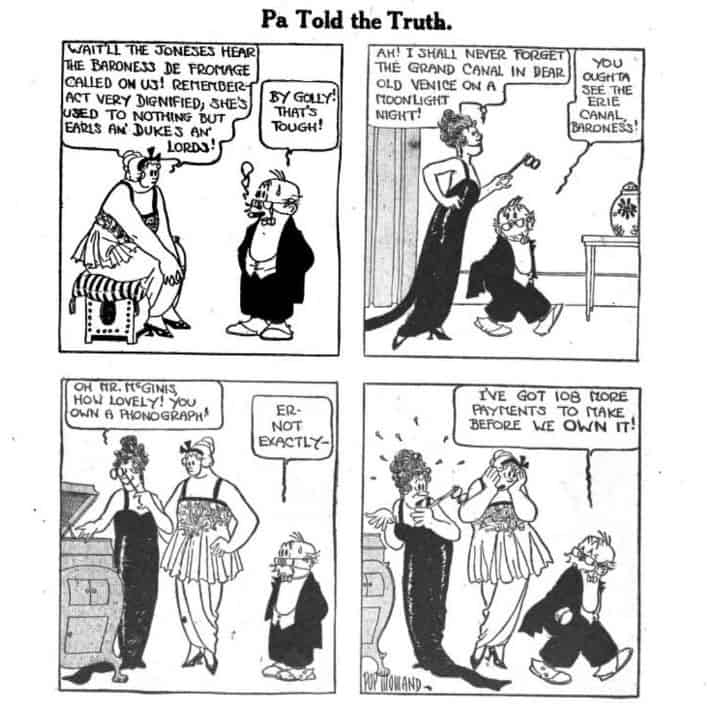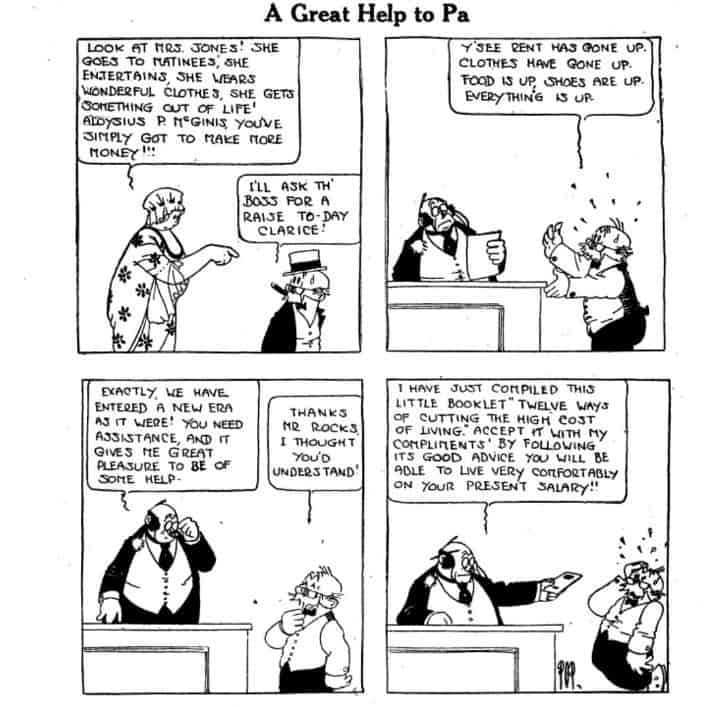Keeping up with the Joneses
It's always fun when disparate worlds of geekdom collide. Today, for instance, I learned that the term “keeping up with the Joneses” — a popular phrase in the realm of personal finance — actually originated in the funny pages.
That's right: “Keeping Up with the Joneses” started out as a newspaper comic strip. As a comics nerd, one who especially loves comic strips, this makes me happy. (Note: For some strips in this post, you can click on the image to open a larger version in a new window.)
Arthur Mormand created “Keeping Up with the Joneses” in 1913. This comic strip (which was very typical for its time) parodied American domestic life, especially the increasing drive toward conspicuous consumption.
The term conspicuous consumption was itself relatively new in 1913. This concept was introduced by Thorstein Veblen, a Norwegian-American economist and sociologist, in his 1899 book The Theory of the Leisure Class. (You can download this book for free from the new Get Rich Slowly file vault.) People at all levels of life, Veblen says, buy things “as an evidence of wealth”, to signal financial “prowess”. This is worth an entire article of its own. (I should re-read the book and write it up, shouldn't I?)
Here's an excerpt from Wikipedia's brief history of the strip:
[“Keeping Up with the Joneses”] debuted on March 31, 1913 in The New York Globe. The strip is a domestic comedy following a family of social climbers, the McGinises: parents Aloysius and Clarice, their daughter Julie, and the family's maid Bella Donna. Various strips feature the McGinis family attempting to match the lifestyle of their neighbors, the Joneses, who are often mentioned but never seen.The strip was later picked up by Joseph Pulitzer's The New York World, and was subsequently syndicated in many other papers by Associated Newspapers. The title and central conceit of a family struggling to “keep up” with the neighbors resonated with its audience, to the point that the phrase keeping up with the Joneses became a common catchphrase.
According to interviews with Mormand, “Keeping Up with the Joneses” was based on his own life. He and his wife lived for a time in Cedarhurst, New York, a relatively wealthy community on Long Island. Mormand claimed his family lived “far beyond our means in our endeavor to keep up with the well-to-do class”.
Eventually, Mormand and his family gave up. They moved to Manhattan. There, he used his experience as source material. Mormand claimed that he originally wanted to call the strip “Keeping Up with the Smiths” but it didn't have the same ring to it as “Keeping Up with the Joneses”.
Some argue that the phrase “keeping up with the Joneses” was already in use when Mormand started drawing his comic strip. This may (or may not) be true. Regardless, it was his work that made the phrase a part of the American vernacular.
While “Keeping Up with the Joneses” never became as popular as, say, “Gasoline Alley” or “Bringing Up Father”, it did achieve some measure of success. At one point, more than 150 newspapers around the U.S. carried the strip. And, for a time, a few of the gags were adapted into short animated films like this one.
If, like me, you are both a money nerd and a comics nerd, you might enjoy browsing this public domain collection of “Keeping Up with the Joneses” strips from 1920. (Again, this is part of the new Get Rich Slowly file vault.)
Mormand died in 1987, at the age of 101. He spent the latter part of his life working as a portrait painter in New York City, but his lasting contribution to American society was coining the term “keeping up with the Joneses”.
Waving Good-Bye to the Joneses
A study out of the U.K. confirms what many of us have already learned: Money only makes you happy if you have more than those around you. According to the London Telegraph:
Despite the vast improvements in general standards of living in the past 40 years across Britain, ‘keeping up with the Joneses' is still our biggest aspiration, the findings suggest.
Researchers have found that owning a fast car, a large home and having a good job may only make you happy if those around you are less well off. The pursuit of wealth is leading more people to work longer hours as they seek to pay their mortgages and climb the social ladder. Dr Chris Boyce, of University of Warwick's psychology department, said Britons were victims of chronic dissatisfaction.
Americans are victims of this same chronic dissatisfaction. It's too easy to compare ourselves with those around us. (And television gives us a chance to make false comparisons: We see what “normal” people have in commercials and in various programs, and we subconsciously begin to want these things too.)
But even if you know that you oughtn't compare your life with others, it can be tough to exercise self-control. It's easy to get swept up by materialism, especially if all of your friends are into it. (If they all have iPhones, you want an iPhone. If they all wear expensive clothes, you want expensive clothes.)
If you want to wave good-bye to the proverbial Joneses — the ones you're always trying to keep up with — you have to quit paying attention to them. You have to make a conscious effort to not care about what they own and do. Instead, focus on your goals and your needs. What you want or need to own shouldn't be defined by what other people have; it should be based on what you want to do in life, and what brings you intrinsic happiness.
Ask yourself at what point you'll have Enough:
- If you have five more DVDs, will that be Enough?
- If you complete your collection of Patrick O'Brian novels, will that be Enough?
- If you buy three more sweaters, will that be Enough?
How much is Enough?
Only you can answer that question — and the answer may change with time. But until you spend some time contemplating Enough, you'll always be tempted to buy what your neighbor buys — to keep up with the Joneses.
The great thing about deciding you have Enough in your life right now is that this also helps you have Enough in the future. If you don't need to spend your money to buy things (because you don't want things), you can use your cash for saving and investing. That money will then be there to assure you have Enough when you're older, too.
How to Stop Keeping Up with the Joneses
The truth is, we all have our Joneses. It doesn't matter how much you earn or what you have; there's always someone who has more. Sometimes it's hard to go without when it seems like everyone around you has everything — but that doesn't mean it's real. In fact, the Joneses are often broke or living a paycheck-to-paycheck existence. What I've found is, what we so often emulate is an illusion to begin with. In fact, the cost of “having it all” is often a lifetime of debt, stress and, of course, work.
If you've been keeping up with the Joneses and your pocketbook shows, it's important not to beat yourself up. So many people have been there themselves, and we all know how hard it is to go against the status quo. But, if you want out, there is always a way. Here's how:
- Stop comparing yourself to others. Since you never know what anyone else's financial picture really looks like, it's important not to see their “apparent success” as “your own failure.” Remember, you don't know their story and it's highly possible that your peers are living beyond their means as well.
- Learn to live within your means. No matter how much you earn, it's important to spend less. Any other strategy is a recipe for failure. Start by tracking your spending to figure out where your money is going. You might be surprised at what you find.
- Stop enabling yourself. If you can't stop spending, be prepared to cut yourself off. Cut up your credit cards if you need to or ask your spouse to do it. Something has to give.
- Commit to your own financial well-being. One of the basic tenets of Get Rich Slowly is that “nobody cares more about your money than you do.” That's why it's important for you to take action to improve your situation. Commit to your own financial well-being, because no one is going to do it for you.
- Find value in yourself and in others. Material possessions cannot fill an empty heart. Instead of spending mindlessly, put your energy into your family and your relationships. That's where the real value is.
No matter how much you earn, the Joneses will always be there. They'll have nicer clothes than you and send their kids to better schools. They'll have better parties and seem happier than most. Just remember, keeping up with the Joneses is not only impossible but also a complete waste of time.
No matter how hard you try, the only way to win against the Joneses is not to play the game to begin with.
Have you ever tried to keep up with the Joneses? What did you learn?
Become A Money Boss And Join 15,000 Others
Subscribe to the GRS Insider (FREE) and we’ll give you a copy of the Money Boss Manifesto (also FREE)







